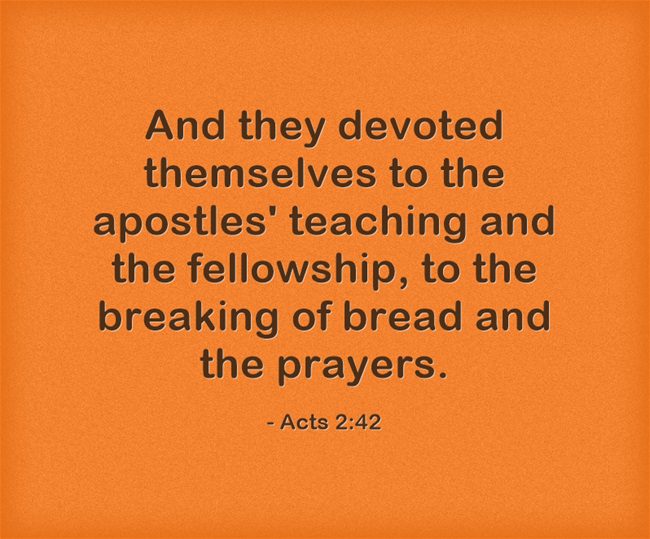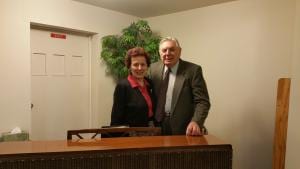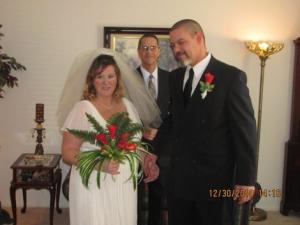Does the church today resemble the church in the 1st century?
Acts 2:42a
In the first century church, they were focused on one thing above others, and that was “they devoted themselves to the apostles’ teaching” (Acts 2:42a), so what was the apostle’s doctrine. I would think it would be the things Jesus commanded them to teach others (Matt 28:19-20), so the apostles’ doctrine comes from Jesus and really isn’t their own. If the church was to grow, in the knowledge of the Lord and in size, they would have to be devoted to Scriptures.
Does the apostles’ doctrine the same thing as Scripture?
What does it mean to be “devoted” to “the apostles’ teaching?”
Is it more beneficial to study alone or in small groups like in a Sunday school or Bible study?
Acts 2:42b
Since the church was devoted to the teachings of Jesus Christ, they would naturally continue in “the fellowship, to the breaking of bread and the prayers” (Acts 2:42b). The breaking of bread could be a reference to eating together and fellowshipping at a meal, but Luke seems to separate fellowship with the breaking of bread, so this could refer to the Lord’s Supper or Communion. Either way, they were people of prayer, and prayer helped the early church to seek God’s will, and part of God’s will for His children is that have fellowship with Him, but also with one another, and of course, be devoted to the Scriptures.
What do you think Luke meant when referring to “the breaking of bread?”
How does fellowship help the church?
What do you think the atmosphere was like at some of these “fellowships?”
Acts 2:44-45
One man told me that he attended a Christian conference for pastors in Romania, and it was the strangest feeling. Here he was half way across the globe, and yet, he felt right at home among a people he had never met nor had little in common…but they had one thing in common; God was their Father, and so they were brothers in Christ, and so it was in the early church, as it says, “all who believed were together and had all things in common. And they were selling their possessions and belongings and distributing the proceeds to all, as any had need” (Acts 2:44-45). If a need came up, someone covered it. That’s what individual members of Christ’s Body, the church, do. We have all things in common (i.e. John 3:16; Acts 4:12; Rom 10:9-13) and so we share with one another, even if it’s sharing in their sufferings.
Have you ever met someone and almost known immediately if they are a Christian?
What signs made you reach that conclusion?
Were there things that made the church appealing to those outside of the church (Acts 2:43)?
Acts 2:46
The church was apparently eager to worship in the early days because they were, “And day by day, attending the temple together and breaking bread in their homes, they received their food with glad and generous hearts” (Acts 2:46), so it was daily worship and then breaking bread in one another’s home, or having a meal together, so being together gave them “glad and generous hearts.”
Does worship and fellowship (like with meals) make a difference in their lives?
In what ways is gladness connected to worship and meals?
Why does it say the received their food with glad and generous hearts?
How can someone that receives have a generous heart?
Acts 2:47a
Toward the end of Acts chapter two, it says of the church, “praising God and having favor with all the people” (Acts 2:47a), so part of the passion of the 1st century church was that they were praising God and possibly, by living godly lives, they had favor with “all the people,” but of course, this doesn’t mean the Jews accepted Jesus Christ and the teaching of the gospel. In fact, under severe persecution, the church still praised God, like the old song goes, “Praise Him in the Storm” as this is very pleasing to God because when you give Him praise, even during times of trouble, He sees you worshiping Him and trusting Him. You don’t praise that which you don’t trust, so the early church trusted the sovereignty of God, no matter what was going on around them.
How can we learn to praise God even in the storms of life?
Does the Christian community still retain some of these 1st century attributes, and if so, which ones?
Why did others favor the early church?
Acts 2:47b
By now, we are wrapping up a week’s view of the early or primitive church. It seems to have been a passionate one because they studied and were “devoted to the apostles’ doctrine,” they fellowshipped together, they shared what they had, and had all things in common and even those outside of the church favored them, at least to an extent. What happened when the church did all of this? God responded to it by adding “to their number day by day those who were being saved” (Acts 2:47b). God added to the church because the church had a solid foundational teaching of the apostle’s doctrine, which was really Jesus’ doctrine that He commanded the disciple to teach others (Matt 28:19-20), and the Word of God has effectual power to change lives and to save souls, so the early church did what they were told to do and God gave the increase.
Which of these elements are missing from your church listed in Acts 2:42-47?
Can you do anything about the missing elements?
Why did God bring growth to the early church?
Article by Jack Wellman
Jack Wellman is Pastor of the Mulvane Brethren Church in Mulvane Kansas. Jack is also host of Spiritual Fitness and Senior Writer at What Christians Want To Know whose mission is to equip, encourage, and energize Christians and to address questions about the believer’s daily walk with God and the Bible. You can follow Jack on Google Plus or check out his book Teaching Children the Gospel available on Amazon.












